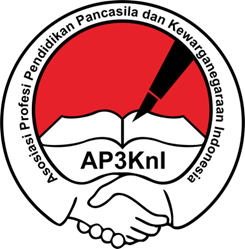Implementing Pancasila Values in Facing the COVID-19 Pandemic – A Study from the City of Cimahi
DOI: https://doi.org/10.26618/jed.v8i1.8702
Implementation, Pancasila Values, Solution, Covid-19 Pandemic
Abstract
Pancasila as the basis and ideology of the state cannot be separated from community programs, because the values in it are the original characteristics of the Indonesian. These values teach how to think and act in overcoming various problems in the life of the nation and state. During the COVID-19 pandemic, it has caused a crisis for the Indonesian, especially for the economic sector. This study aimed to find out the embodiment of Pancasila values that grew and developed in people's lives in Cimahi City during the COVID-19 pandemic. The approach used was qualitative approach. There were 115 respondents who were interviewed in three sub-districts and sub-districts, namely 30 respondents in Cibeureum Subdistrict (South Cimahi Subdistrict), 20 respondents in Cimahi Subdistrict, and 20 respondents in Setiamanah Subdistrict (Cimahi Tengah Subdistrict), 25 respondents in Citereup Subdistrict, and 20 respondents in Cipageran Subdistrict (North Cimahi District). The results of the study show that the values of Pancasila as the basis and ideology of the Indonesian state, are the values that could strengthen community resilience in overcoming crises. The strength of these values was shown by their belief in God the Almighty and obedience to worship both horizontally and vertically, the belief that humans are born and created with the same dignity, respected each other without discrimination, promoting unity, togetherness and mutual cooperation, prioritizing deliberation based on the spirit of kinship in overcoming problems, being fair by maintaining an equality between obligations and rights. The people in Cimahi City were able to implement values in Pancasila as a way of thinking and acting to overcome the crisis of social life, as faced in the current pandemic situation.References
Arif, S. (2020). Pemurnian Kembali Pancasila. https://mediaindonesia.com/opini/354505/pemurnian-kembali-pancasila
Azis, R. F. (2020). Hadapi Pandemi dengan Nilai Pancasila. https://www.itera.ac.id/hadapi-pandemi-dengan-nilai-pancasila/
Damanhuri, D., Bahrudin, F. A., Legiani, W. H., & Rahman, I. N. (2020). Implementasi Nilai-Nilai Pancasila Sebagai Upaya Pembangunan Karakter Bangsa. Untirta Civic Education Journals (UCE), 1(2), 285=289.
Darmadi, H. (2013). Urgensi Pendidikan Pancasila dan Kewarganegaraan di Perguruan Tinggi. Alfabeta.
Dipoyudo, K. (1990). Membangun Atas Dasar Pancasila. Centre for Strategis and International Studies.
Fadilah, N. (2019). Tantangan dan Pengautan Ideologi Pancasila Dalam Menghadapi Era Revolusi Industri 4.0. Journal of Digital Education, Communication, and Arts, 2(2), 66–78.
Fajar, A. (2011). Panduan Pengembangan Pendidikan Budaya dan Karakter Bangsa di Sekolah.
Firdaus, R. A., & Dewi, D. A. (2021). Implementasi Nilai-Nilai Pancasila dalam Meningkatkan Sumber Daya Manusia Indonesia. Jurnal Kewarganegaraan, 5(1), 184–191.
John, C. (2010). Research Design, Pendekatan Kualitatif, Kuantitatif, dan Mixed. Pustaka Pelajar.
Komalasari, K. (2020). Revitalisasi Pancasila Dalam Merespon Pandemi Covid-19. Jurnal Majelis, 15, 25–45.
Latif, Y. (2015). Negara Paripurna: Historitas, Rasionalitas, dan Aktualitas Pancasila. PT. Gramedia Pustaka Utama.
Maher, P. J., Roth, J., Griffin, S., Foran, A. M., Jay, S., McHugh, C., Ryan, M., Bradshaw, D., Quayle, M., & Muldoon, O. T. (2021). Pandemic Threat and Group Cohesion: National Identification in the Wake of COVID-19 is Associated with Authoritarianism. The Journal of Social Psychology, 9, 1–17.
MKU, T. P. P. (2016). Modul Pancasila. Universitas Brawijaya.
Mudjiyanto, B., & Dunan, A. (2021). Implementasi Nilai Pancasila di Saat Pandemi Covid-19 Implementation of Pancasila Values in the Pandemic of Covid-19. Majalah Semi Ilmiah Populer Komunikasi Massa, 2(2), 105–118.
Muzayin, A. (1992). Ideologi Pancasila (Bimbingan ke Arah Penghayatan dan Pengamalan bagi Remaja). Golden Terayon Press.
Nurgiansah, T. H. (2021). Pendidikan Pancasila. CV. Mitra Cendekia Media.
Octavian, W. A. (2018). Urgensi Memahami dan Mengimplementasikan Nilai Nilai Pancasila Dalam Kehidupan Sehari-Hari Sebagai Sebuah Bangsa. Bhineka Tunggal Ika: Kajian Teori Dan Praktik Pendidikan PKN, 5(2), 123–128.
Lemhanas RI. (2020). Penerapan Nilai-Nilai Pancasila dalam Menanggulangi COVID-19.
Saputra, I. (2017). Aktualisasi Nilai Pancasila Sebagai Kunci Mengatasi Penyalahgunaan Narkoba di Indonesia. JPK: Jurnal Pancasila Dan Kewarganegaraan, 2(2), 25–34.
Badan Pusat Statistik. (2020). Hasil Sensus Penduduk Indonesia 2020.
Sudjana, S. (2018). Hakikat Adil Dan Makmur Sebagai Landasan Hidup Dalam Mewujudkan Ketahanan Untuk Mencapai Masyarakat Sejahtera Melalui Pembangunan Nasional Berdasarkan Pancasila. Jurnal Ketahanan Nasional, 24(2), 135–151.
Sumarto, S. (2018). Pancasila Membentuk Pendidikan Karakter Bangsa Melalui Proses Pendidikan Keislaman. Nizham: Jurnal Studi Keislaman, 6(1), 59–66.
Susilo, J. (2020). Nilai Pancasila sebagai modal hadapi pandemi COVID-19. https://www.antaranews.com/
Tirtawinata, C. M. (2021). Nilai-Nilai Pancasila sebagai Dasar Perkembangan IPTEK.
Widiatmaka, P. (2016). Pembangunan Karakter Nasionalisme Peserta Didik di Sekolah Berbasis Agama Islam. JPK: Jurnal Pancasila Dan Kewarganegaraan, 1(1), 25–33.
Widjojo, A. (2020). Konferensi Pers Gugus Tugas Penanganan COVID-19. http://www.lemhannas.go.id/
Winarno, W. (2013). Perubahan Global & Penguatan Pilar Kebangsaan melalui PKn. Citizenship: Jurnal Pancasila Dan Kewarganegaraan, 1(2), 88–111.
Yin, R. K. (2014). Case Study Research Design and Methods (5th ed.). SAGE Publications Inc.
Zaedun, Z. (2012). Implementasi Nilai-Nilai Pancasila Sebagai Falsafah Pandangan Hidup Dapat Meningkatkan Kesadaran Masyarakat Dalam Ketahanan Pangan. https://fh.unpatti.ac.id/implementasi-nilai-nilai-pancasila-sebagai-falsafah-pandangan-hidup-dapat-meningkatkan-kesadaran-masyarakat-dalam-ketahanan-pangan/




